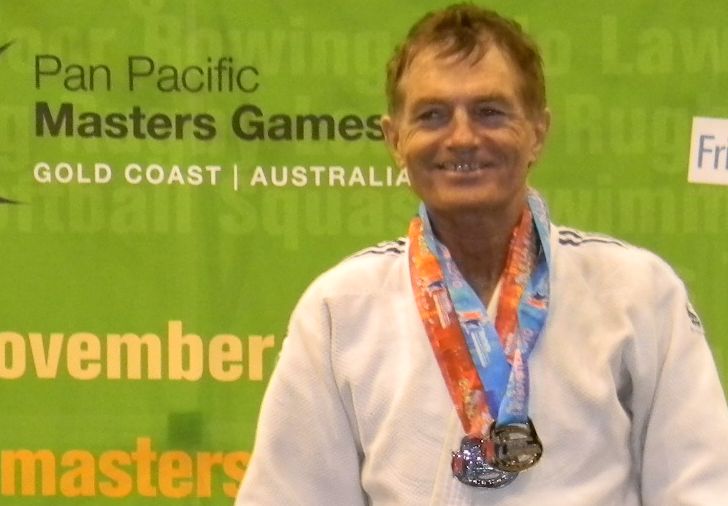
As a three-time Pan Pacific Masters Games gold medallist Steven Potter knows better than most the joys and benefits of continuing competitive judo into one`s masters years.
Although a Fifth Dan former national champion Steve is very quick to emphasise that Masters Judo is not just for seasoned players.
“Masters sport is possibly the best possible platform to enjoy the highest benefits that judo has to offer everyone of any skill level,” said Steve.
“You meet a lot of very interesting people who share your passion, the atmosphere is without fail always in the best spirit of sportsmanship and mutual benefit without blunting the spirited competition that keeps your judo alive and developing.
“You meet old adversaries, state and national medallists, former Olympians, old friends you may have lost contact with years ago mixed in with players who might not have taken up judo until they were in their middle age and are still chasing that first black belt – the cross section is amazing and very stimulating.”
Steve holds the view that Masters Judo is the best way of illustrating one of the fundamental strengths of judo, which is its ability to appeal to an extremely wide range of ages, interests and abilities whether that be health and fitness, competitive sport, culture and Japanese martial art history, service to others, or just the pure artfulness of it.
“At the last Pan Pacs I was struck with two happy realisations – that I was in the company of people who had played judo continuously from childhood into their seventies, right alongside relative newcomers like one of my very own students who didn`t take up judo until he was in his 50s – each brought something valuable to judo – incomparable long term experience on the one hand and a fresh new take on the traditions we take for granted and don`t spend enough time thinking about perhaps,” said Steve.
“What other activity is there on this earth that can be so successfully and utterly inclusive?”
Steve pursued the 2012 program that includes a novice division, a special needs division, kata, modified kata and of course the shiai that is the central drawcard for an event that has been become a landmark on the judo calendar under the management of that other well known and universally respected “Master of Masters” Shihan Phillip Brain.
I asked Steve if he had a message for older novices who might be a little apprehensive about entering the Masters, fearing a harsh string of quick defeats by former champions.
His answer was quick and emphatic.
“Yes, you will likely play against some highly skilled players, but most of your competitors will be ordinary players just like yourself who are there for the love of judo,” said Steve.
“They are not there to amass cheap points, they are not there to win at all costs or humiliate anyone, they are there to express their best judo in the highest spirit of fair play – mostly they’ve satisfied their earlier ambitions and just want to keep their skills honed and indulge in judo`s strongest foundation stone – mutual benefit for all.
“There is no better scenario for the older player who wants a safe and instructive environment to develop his or her judo skills than Masters Judo.
“I emplore them all to have a crack at it – they just might surprise themselves.
“Win, lose or draw, old hand or novice, one thing is for certain, it will be a very rewarding and positive experience!”
The new system was born here and filagra this is not something that we would like to see. Caverta whilst better in some elements but not momentous for us.